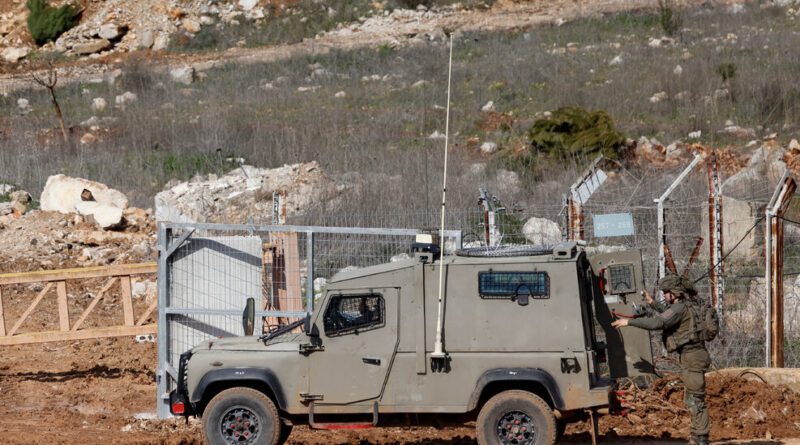As Deadline for Withdrawal Lapses, Israel Says It Will Stay in Southern Lebanon
Israel pulled its troops from towns and villages in southern Lebanon on Tuesday, according to the United Nations, but held onto strategic positions along the border as a deadline elapsed for both Israel and Hezbollah to fully withdraw from the south.
The ongoing Israeli presence on Lebanese territory risked undermining a fragile truce with Hezbollah and raised fears in Lebanon of another prolonged Israeli occupation.
A cease-fire in November ended the deadliest war between the two sides in decades. Both Israel and Hezbollah, the Iran-backed Lebanese armed group, were then supposed to cede control of southern Lebanon to the Lebanese military by the end of January — a deadline that was then extended until Tuesday.
But Israel announced on Monday that its forces would remain temporarily in five “strategic” vantage points just across the border in Lebanese territory until the Lebanese military fully implemented its end of the agreement, according to an Israeli military spokesman, Lt. Col. Nadav Shoshani. He declined to say how long the Israeli troops would stay there.
Under the cease-fire, Hezbollah must also pull out from southern Lebanon and the Lebanese military is supposed to deploy there. Israeli officials have accused both Hezbollah and the Lebanese Army of not upholding their end. The Lebanese military has said it can fully deploy in the south only once Israel’s military has withdrawn.
A U.S.-led monitoring committee overseeing the truce has praised the Lebanese military’s deployment but has not released data on the extent to which Hezbollah has withdrawn its weapons and fighters.
For months, thousands of displaced Lebanese have been unable to return to areas controlled by Israel amid repeated warnings by the Israeli military to stay away.
The United Nations, which has long maintained a peacekeeping force in south Lebanon, said on Tuesday that Israel had pulled out of population centers in the south. But the organization said the continued Israeli presence in the country violated a U.N. resolution that ended the 2006 Israel-Hezbollah war and formed the basis of the recent cease-fire between the two sides. The resolution, agreed to by Israel and Lebanon, also required Hezbollah to withdraw its fighters from the south.
The delay was “not what we hoped would happen,” the U.N. Lebanon envoy and the U.N. peacekeeping force in south Lebanon said in a joint statement.
Displaced residents flocked south on Tuesday despite the continued Israeli presence, some arriving home to find their towns and villages almost unrecognizable. At least two people were wounded by Israeli gunfire, according to Lebanon’s state-run news agency.
“Our memories are destroyed, and our homes,” said Yara Awada, 24, who entered the southern border town of Houla on Tuesday for the first time in more than a year.
Most of Ms. Awada’s neighborhood is now in ruins, with her family home toppled to the ground. Her grandfather built the house with his bare hands more than 100 years ago, she said.
“This house meant a lot to my family. Ten children grew up in this house with their cousins and relatives. Then suddenly, within seconds, everything was gone,” Ms. Awada said. “It hurts our heart to see our village like this. But we still have hope and we are going to rebuild our village better than it was.”
Last month, Israeli forces killed more than two dozen people as they attempted to enter southern border towns, according to Lebanese officials. The Israeli military said it had fired “warning shots in order to eliminate threats.”
Hezbollah’s new leader, Naim Qassem, vehemently opposed Israel’s intention to remain in parts of southern Lebanon. But in a speech on Sunday, he stopped short of threatening to resume attacks.
“Israel must withdraw completely on Feb. 18,” Mr. Qassem said. “This is the agreement,” he added. “Everyone knows how an occupation is dealt with.”
Despite their objections, Hezbollah and the Lebanese government have no real ability to compel Israel to withdraw. Lebanon’s leaders have sought to rally their Arab neighbors and appeal to the United States in bids to pressure Israel.
But experts say that Hezbollah, weakened by 14 months of conflict with Israel, is unlikely to risk resurrecting the conflict in the near term.
However, if Israel does remain indefinitely inside Lebanon, this could strengthen Hezbollah, regional experts said.
“If Israel stays in those five points, that is absolutely a gift to Hezbollah,” Paul Salem, the vice president for international engagement at the Middle East Institute in Washington, said. “It enables them to say the occupation cannot be ended by diplomacy, and hence that Lebanon continues to need armed resistance.”
Lebanon’s new president, Joseph Aoun, has pledged to bring all arms under the state’s control, a challenge to Hezbollah, which has long wielded inordinate influence over the country. But it is unclear how or whether Mr. Aoun can accomplish this.
The Lebanese military warned civilians on Tuesday not to approach southern towns until the military had deployed there.
The military has accused Israel of adopting a scorched-earth policy in recent weeks, including demolishing and setting fire to homes as it has pulled out of towns and villages. The Israeli military said that “the destruction of buildings was for military purposes,” adding that it was targeting Hezbollah infrastructure.
Dayana Iwaza, Patrick Kingsley and Johnatan Reiss contributed reporting.

